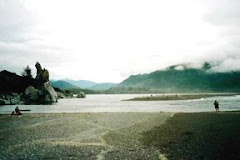EricaTerence has been selected for the position of Klamath Riverkeeper. She joins Scott Harding (Executive Director) and Melena Marvin (Outreach & Science Director) on the KR staff.
Erica grew up on the Salmon River and attended the Forks of Salmon school. Her parents - Malcolm and Susan - came to Black Bear Ranch many years ago and now live at Butler Flat on the lower Salmon River. Erica previously worked for the Northcoast Environmental Center as ECONEWS editor and on Klamath River issues. KlamBlog wishes Erica great success as Klamath Riverkeeper!
The KR web site is http://www.klamathriver.org/. You can read KR's Klamath River News there or sign up for an e-mail copy.
_______________________
Tell the Water Board that Scott water quality needs more help!
There are currently three outstanding opportunities to improve water quality in the Scott River. The Scott River Sediment and Temperature TMDL Action Plan is currently being implemented by the North Coast Water Quality Control Board. As part of Implementing the Scott TMDL, the NCWQCB is developing MOUs with the Forest Service and BLM to address sediment and temperature issues. Road management is a key sediment issue.
Research and experience indicate that native surface (dirt) and gravel roads are responsible for much of the sediment problem. Failure to properly maintain the roads has been shown to accelerate road failure, landslides and sediment delivery to streams The Forest Service and BLM have thousands of miles of these roads in the Scott watershed. Therefore the MOUs with the Forest Service and BLM should address ROAD MAINTENANCE. The Forest Service has funding to maintain less than 25% of national forest roads. This failure to maintain roads leads sooner or later to sediment delivery to streams. Klamath River advocates will want to insist that Road Maintenance is adequately addressed in the MOUs.
The situation is even worse on private industrial timberlands but there is no evidence that the Water Board is addressing the lack of maintenance on private gravel and dirt (native surface) roads. Siskiyou County has refused to adopt a grading ordinance. The Water Board should therefore work directly with large landowners (the timber companies) to address the lack of road maintenance on industrial timberlands.
The NCWQCB is also in the process of deciding when a Grazing Management Plan will be required on the Scott. Public land grazing is notoriously unmanaged in the Scott River Basin and throughout the Klamath Mountains. Cattle are released into the wilderness in summer and basically left to fend for themselves. As a result they often congregate in riparian areas and in the streams themselves as well as in wet meadows. In fact, at times the Forest Service actually orders the ranchers to hold the bovines in small lower pastures to allow upper pastures time to go to seed. This happens when we have a late spring. When cattle are confined to small lower pastures they hang out in or near the streams trampling the banks and eating the riparian vegetation. When winter storms come the trampled banks bleed sediment into streams. The loss of riparian vegetation leads to elevated stream temperature. Degraded stream condition is the result. This can be avoided if the rancher has a ranch hand ride the range moving the cattle and salt blocks. In bygone days teenagers had the job of riding the upper range often staying in the wilderness all summer long. But this traditional cultural activity is rarely if ever practiced today.
To address the public land grazing issue the MOUs being developed with the Forest Service and BLM should commit the agencies to requiring herding and other management actions to prevent bovines from congregating in riparian areas with associated bank trampling sedimentation and negative impacts on stream temperature.
Those who wish to advocate for road maintenance requirements and improved grazing management in the Scott River Watershed in order to reduce sedimentation and lower stream temperature should contact Catherine Kulhman, Executive Officer of the North Coast Water Quality Control Board at 707-576-2225 or ckuhlman@waterboards.ca.gov. Be sure to let her know that your comment is about Scott River TMDL Action Plan implementation.


No comments:
Post a Comment